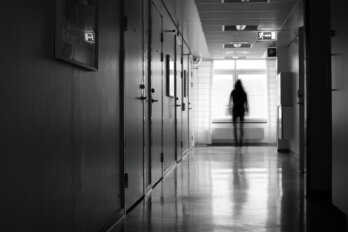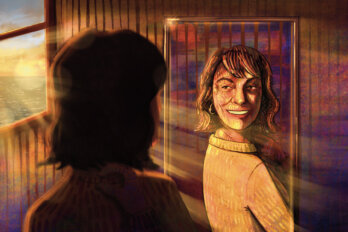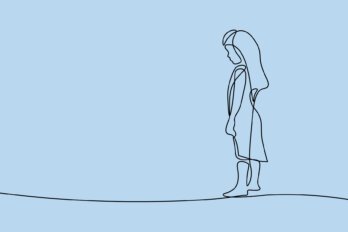I hide behind the morning papers. Like my father before me, I create a little teepee of space for myself at the breakfast table. There, between the tip of my nose and the intoxicating ink-scented page, I am a supreme being. I do whatever I want, say whatever pleases me, and nobody, not even my ten-year-old daughter, is allowed into my space, for the simple reason that it is my space, my lair, my palace.
“Dad.”
“Sweetie, Daddy is reading the paper so please don’t bother him.”
“Dad… Is Mahmoud Abbas really the biggest asshole alive?”
Alarmed but not quite ready to surrender shoreline, I offer an abridged version of the anxiety welling up in my breast.
“Sweetie, who told you that? Your teacher, Ms. Halloochis? I told you to stay in French Immersion.”
“Dad!”
OK. It was time to peek out. Just peek out.
“Well?”
“Dad, remember when Mr. Abbas quit, you said he was the biggest asshole…”
“Sweetie!”
“That’s what you said.”
“Daddy doesn’t use that kind of language.”
“Dad, yesterday when you were reading your newspaper…”
“Sweetie, Mr. Abbas had a tough job, and Daddy is not really qualified to judge whether he’s an asshole or not.”
“But that’s what you said.”
“Really. And what else did I say?” Bad move.
“You said that the privacy com-missioner will fry in hell if he thinks you’ll pay his wine bill. And you said that Tony Blair should join a boys’ choir and leave government to men who can stand up to George. And…”
“Sweetie, aren’t you going to be late for school?”
“Yes, Dad. But Dad.”
“What?”
“Dad, I asked my teacher if Mahmoud Abbas was the biggest asshole alive, and she asked me the same question you did, which is who told you that, and I said that you did, and she told me that I should tell you to seek help. What kind of help should you seek, Dad? Does Mahmoud Abbas want to hurt you?”
I sought help. My therapist makes me sit at his breakfast table and read the newspaper while he sits by, scribbling all sorts of notes to himself. He tells me I should try to read without moving my lips, and that if, in fact, I could do that, he would recommend that we scale back from our present schedule, which calls for three meetings daily. Dr. Ramsbottom came recommended by my dentist. “Believe me, he’s really good with the aggression thing,” Dr. Lorenzo said as he picked up the diamond drill.
I flailed objections, trying my damnedest to suggest that “my condition,”so to speak, had nothing to do with aggression, was in fact a superannuat-ed tradition that got me going in the morning—sort of like the daily cross-word or an espresso.
“Open wide,” Dr. Lorenzo said, and then, “The privacy commissioner will fry in hell before I pay his wine bill.”
When I first started therapy three months ago, Dr. Ramsbottom told me that I could begin reading at whatever section I wished. I opted for the Obits, which I had never read before, but was convinced I could read without commentary because, after all, I have some respect for dead people, and don’t know all that many, and believe that they have the right to die if they wish.
As it turned out, this was the day a certain Mrs. Dinkel, who had apparently taken a degree at King’s College in Cambridge and had, for fifty-odd years, taught school in the Sault, passed away at the good age of seventy-six. “Who gives a shit?” I blurted out.
Dr. Ramsbottom, delighted, scribbled madly for the rest of the session, near the end of which he said, “Mr. Bell, perhaps next time we should get you to begin with something less charged—shall we say the front page? It is just that I worry about cardiac arrest, if you get my drift.”
No, Dr. Ramsbottom. I do not get your drift. I don’t get anything about you. And you get less than nothing about me.
My father was a profoundly conservative man who read the morning paper on a sort of ascending musical scale of anxiety. He would accompany the front section with grumbles barely audible, “Gawdamn Trudeau, Gawddamn Davis, Gawdamn Crombie.” To this litany he invariably tagged a strange counterpoint, “Poor Old Nixon.”
He would then skip to the sports section, which, in the winter months of the mid-seventies, meant a swelling chorus of:
Fucking Harold Ballard.
Fucking Harold Ballard.
Look what he’s doing to the Leafs.
But the really heavy stuff came with the business section. “This guy doesn’t have a single god damned clue what he’s taking about. What claptrap, hokum, absolute tommy-rot.”
My dad’s point seemed to be that the paper was a little off when it directed its journalistic attentions to subjects into which he had privileged understanding.
This is not a condition from which I suffer. Having joined the ranks of journalism, a trade for which my father had such contempt, I have no particular expertise in anything. So, though I do rant a little when I read the paper, it is a more balanced, nuanced, sophisticated sort of ranting than my dad’s.
Most days I read three papers: The Globe and Mail, the National Post, and The New York Times. I read these papers for the following reasons.
1. The Globe and the Post are usually the subject of conversations which I am party to every day. Rarely does a conversation start with “Hey, did you read that thing in the Sun?” or “Hey, did you see that extraordinarily well-reported bit of scandal in Frank magazine?” This despite the fact that everyone I know reads the Sun and Frank.
2. I read The New York Times because it tells me what’s going on in the world from the point of view of the folks managing this dump.
Dr. Ramsbottom noted that, as a general rule, I didn’t get nearly so exercised about things I read in The New York Times and wondered if I could tell him why that might be.
“It is completely irrational,” I told him, quite calmly and hardly shouting at all, “to get all worked up about the Americans since they are going to do whatever the hell they like anyhow, and yelling at their paper of record is just so much pissing in the wind.”
Dr. Ramsbottom wrote a paper, which he submitted to a high-end journal of medicine. I happened to read it at my barber’s.
“The paroxysms observed in Patient B can be likened to febrile seizures. Catalysts are wholly random and unpredictable (see graph below) suggesting neurological abnormality and/or excess testosterone affecting blood flow to upper regions.”
I did not say a word (and not be-cause Tony was just then shaving around my philtrum), but instead I wrote a letter to the journal’s editor.
Dear Editor,
When your illustrious magazine published the case study of Patient B, did you consider the possibility that his rants may be perfectly understandable.
Take, for example, the thing he was on about the other day. Lorne Rubenstein, the golf writer for Canada’s well-written, well-read newspaper, The Globe and Mail, wrote a column recounting the unlikely circumstances leading to Ben Curtis winning the British Open. Lorne wrote:
“Here’s an oddity. Masters champion Mike Weir was born on May 12, 1970, and U.S. Open champion Jim Furyk was born on the same date. Now listen to this. Andrew Coltart, a Scottish player, was born on May 12, 1970, also, and people were conjuring up the idea that he would win the Open. But he didn’t play the Open. Curtis called Clarke Jones, his manager at International Management Group in Ohio, and asked his help in getting a caddy. IMG got Andy Sutton, an English caddy, to work for Curtis. Sutton is Coltart’s caddy. So the May 12, 1970, birthday weirdness continued. Maybe it’s a stretch. But it’s no more of a stretch than what transpired yesterday…”
I mean, come on. Who puts out this kind of stuff? The Flat Earth Society? Is there not enough magic in three under par? And that’s not the end of it, Mr. Editor. Not for a minute. Mr. Rubenstein goes on drawing these preposterous connections, so that a perfectly decent annual tournament in Sandwich, England, starts to sound like a goddam Blair Witch revival.
Curtis, he writes, “attended Kent State University in Kent, Ohio—Sandwich, incidentally, is in the county of Kent…” And my ass is –
I couldn’t even finish that sentence before spewing a mouthful of orange juice across the table and finding myself speaking what was more or less Lithuanian. What has any of Lorne’s twaddle to do with the price of rice?
Charlotte, my ten-year-old, eventually cocked an italicizing brow, paused to wipe orange juice off her tunic, and offered some solace, “Dad, he’s a golf writer.”
But I ask you, Mr. Editor—are golf writers not human beings? And if so, how can they write things like this?
Yours truly,
Patient B.
There are times when the ranting man is wholly without solace.
For me, the most desolate day of my life came on September 12, 2001. I was stuck in the free port of Dubai, home of the Dubai Islamic Bank, widely considered to be Osama’s laundromat.
I was, to put it bluntly, scared shitless. Also, I felt exposed, violated, shattered. I wanted my patch of privacy—my teepee—badly, but could not get myself to set foot out of the hotel, which only sold Arabic-language newspapers. Instead, I decided to make my way down to the lobby where, on the net, I could read my daily paper, The Globe and Mail, on line. Here’s what it said:
“Those who are responsible are most likely men from…cultures built on blood and revenge…men whom most Americans, in their innocent and happy secularism, can scarcely comprehend.”
It’s hard for me to describe how easily fear transformed into curdling rage.
“Innocent and happy secularism?”
I responded, more than audibly. “The same innocents who slaughtered hundreds of thousands of Japanese as a warning to the Soviets that America could do the same to them? The same innocents who, in 1984, ‘inadvertently’ gassed thousands of Bhopalians to death as they slept?”
Evidently, I had been screaming at the monitor for some ten minutes when a worried-looking busboy, dressed in a crisp white jalabya, sporting a whispy, boy’s moustache, tapped me on the shoulder.
“Sir, are you all right?”
“Sweetie, Daddy is reading the newspaper. Please do not bother him.”
“Sir? Hello? Sir?
Are you all right?”





